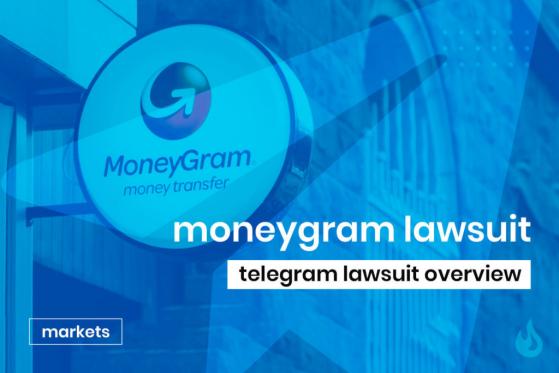MoneyGram Slapped with Lawsuit over Use of XRP
DailyCoin
Published Mar 04, 2021 02:16PM ET
Updated Mar 04, 2021 02:30PM ET

MoneyGram Slapped with Lawsuit over Use of XRP
- Aggrieved MoneyGram investors filed a class-action lawsuit against the remittance firm this month for its use of Ripple’s XRP.
- In 2019, MoneyGram announced a partnership with Ripple to use XRP in its cross-border payments process.
- Fast forward to 2021, MoneyGram severed ties with Ripple after the SEC filed a complaint alleging the company violated securities laws in 2020.
Remittance giant MoneyGram is walking a tightrope after investors lashed out and filed a class-action lawsuit accusing the firm of making false statements about its use of the digital asset XRP.
In 2019, MoneyGram announced a partnership with Ripple to use its digital asset, XRP, to expand Money Gram’scross-border payment process. In 2020, the Securities and Exchange Commission threw a monkey wrench into those plans when it alleged that Ripple had violated securities laws by raising funds through the sale of XRP. The SEC claimed XRP was an unregulated security and that Ripple found itself on the wrong side of the law by selling it without regulatory approval.
Following this revelation, MoneyGram dropped XRP, losing out on a “lucrative stream of market development fees that was critical to its financial results” in the process,” according to the class-action complaint.
MoneyGram and Ripple: A Seemingly Perfect Match
In 2019, MoneyGram, a US-based remittance payment company, entered into a partnership with Ripple in a deal that saw MoneyGram utilize Ripple’s xRapid service (which helps banks that use XRP).
The xRapid service allows MoneyGram to make fast, cheap payments to several countries without the need to hold foreign currency. The xRapid service relied on Ripple’s XRP to enable ease of transactions by converting a currency to XRP and reconverting it to the local currency of the country where funds are to be sent.
Ripple had been paying MoneyGram to utilize XRP, and sources say the fees were in the neighborhood of $60 million. However, on February 22, MoneyGram announced that it had stepped away from the partnership, citing Ripple’s current legal woes.
Class-Action Lawsuit Hovers over MoneyGram
The Rosen Law Firm is representing the class in this matter. The law firm alleged that MoneyGram had “made false and/or misleading statements and/or failed to disclose that: XRP, the cryptocurrency that MoneyGram was utilizing as a part of its Ripple partnership, was viewed as an unregistered and therefore unlawful security by the SEC.”
The Securities and Exchange Commission alleged that Ripple sold $1.3 billion worth of unregistered XRP. The SEC and Ripple noted that there is a minute chance of settlement between the parties, meaning the likelihood of a full trial is high.
As the SEC pursues action against Ripple, MoneyGram is losing a huge portion of its income stream, which was instrumental to the boom of its financial results. According to Rosen, investors purchased MoneyGram shares after it announced a partnership with Ripple based on the company’s public assurances that XRP had complied with all SEC regulations.
The law firm stated that MoneyGram’s “public statements [about XRP] were materially false and/or misleading at all relevant times. When the true details entered the market, the lawsuit claims that investors suffered damages.”
The class-action lawsuit was filed on behalf of shareholders who purchased MoneyGram securities between June 17, 2019, and February 22, 2021, and it could see MoneyGram pay damages or a settlement running into millions of dollars.
On the Flipside
- Cardano gains 18.06% within the last seven days while XRP loses 9.72%, according to CoinMarketCap.com
- Elon Musk recently changed his Twitter profile picture to feature a fork literally stabbed into a road accompanied by the bio: “meta for k.”
- An Ethereum and Web3-Compatible sidechain is coming to Bitcoin Cash in a partnership that means a lot for DeFi.
Telegram Facing Similar Legal Troubles
Amid an avalanche of crypto-related lawsuits, Telegram has been hit with a $100 million compensation request from Da Vinci Capital regarding the latter’s investment in the instant messaging platform’s $1.7 billion initial coin offering (ICO) to build the now-shelved Telegram Open Network (TON).
In its compensation request letter, Da Vinci Capital has given Telegram two weeks to respond to the request before approaching the courts.
This comes after the SEC put the kibosh on Telegram’s ambitious TON project in October 2019. Similar to the XRP saga described above, the US regulator alleges Telegram raised funds for its ICO without registering the underlying security (its proposed Gram token) with the SEC. Following this setback, Telegram shut down the TON network project and offered investors 72% of their initial investments back immediately or 110% of their investment if Telegram could keep the capital until April 2021.
Continue reading on DailyCoin

Written By: DailyCoin
Trading in financial instruments and/or cryptocurrencies involves high risks including the risk of losing some, or all, of your investment amount, and may not be suitable for all investors. Prices of cryptocurrencies are extremely volatile and may be affected by external factors such as financial, regulatory or political events. Trading on margin increases the financial risks.
Before deciding to trade in financial instrument or cryptocurrencies you should be fully informed of the risks and costs associated with trading the financial markets, carefully consider your investment objectives, level of experience, and risk appetite, and seek professional advice where needed.
Fusion Media would like to remind you that the data contained in this website is not necessarily real-time nor accurate. The data and prices on the website are not necessarily provided by any market or exchange, but may be provided by market makers, and so prices may not be accurate and may differ from the actual price at any given market, meaning prices are indicative and not appropriate for trading purposes. Fusion Media and any provider of the data contained in this website will not accept liability for any loss or damage as a result of your trading, or your reliance on the information contained within this website.
It is prohibited to use, store, reproduce, display, modify, transmit or distribute the data contained in this website without the explicit prior written permission of Fusion Media and/or the data provider. All intellectual property rights are reserved by the providers and/or the exchange providing the data contained in this website.
Fusion Media may be compensated by the advertisers that appear on the website, based on your interaction with the advertisements or advertisers.